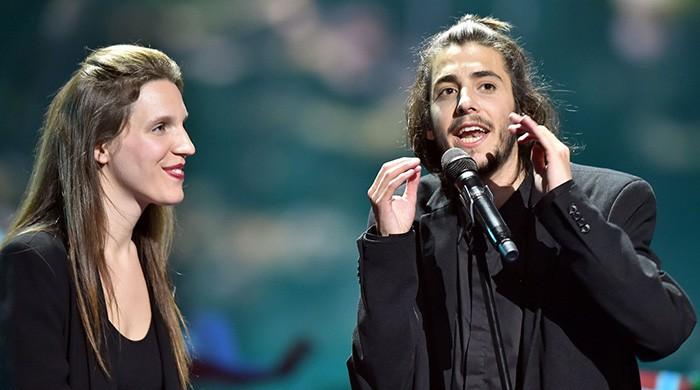
KIEV: Portugal won the Eurovision Song Contest for the first time ever early Sunday with a melancholy ballad performed by a singer who suffers from a serious heart condition.
The fado-tinged song "Amar Pelos Dois" was performed by 27-year-old Salvador Sobral, who is awaiting a heart transplant.
It scored a crushing victory, winning top marks both from the televoters and the countries´ professional juries.
The black-clad singer took to a small separate stage for his minimalist performance of the song composed by his sister Luisa.
"I don´t know about national hero," Portugal´s first ever winner told journalists afterwards, adding jokingly "I think the real hero is (Portugese footballer Cristiano) Ronaldo."
"I just wanted to sing a beautiful song as it is -- it´s in Portugese," he said of his decision to sing in his native language despite speaking fluent English.
"If I can help to bring some change to music, I will be really joyful."
The ceremony in the capital of ex-Soviet Ukraine began with a glittering light show as the contestants took bows on a stage lit up in the colours of their respective national flags.
Jon Ola Sand, executive supervisor of Eurovision afterwards praised the "amazing set-up" in Ukraine and Sobral´s performance.
He said the winner was "bringing music back to the Eurovision Song Contest."
But the glitzy contest was marred by the ongoing fighting with Moscow-backed separatists in eastern Ukraine and Ukrainian President Petro Poroshenko opted not to attend after four civilian deaths.
The annual celebration of catchy europop, ludicrous costumes and glittering divas watched by some 200 million TV viewers was being hosted by Ukraine for the second time.
Bulgaria´s big-voiced 17-year-old singer Kristian Kostov came second with a confident performance of "Beautiful Mess".
Third was Moldova´s SunStroke Project with a raucous song called "Hey, Mamma" featuring a saxophonist in sunglasses and dancers in wedding dresses and veils.
The latest edition of the contest, that began in 1956 with just seven countries, offered the usual wacky stage acts and cheesy beats.
Italian Francesco Gabbani, who came sixth, invoked Hamlet and Desmond Morris´s anthropology book "The Naked Ape" in his song while a gorilla-costumed dancer boogied alongside him.
Romania came seventh with an unlikely combination of yodelling and rap while Azerbaijan´s act that came 14th featured a man wearing a horse´s head on a stepladder.
Macedonia´s contestant Jana Burceska failed to make the final but stole the show during the semi-finals by receiving a televised marriage proposal and screaming "Yes!" as her boyfriend knelt down with a ring.
Britain may be experiencing a post-Brexit vote chill in Europe, but pulled out all the stops with a big ballad performed by Lucie Jones, coming 15th.
Portugal was celebrating their big win Saturday with President Marcelo Rebelo de Sousa saying: "When we are very good, we´re the best of the best. Congratulations Salvador Sobral."
Garlands, rainbow flags
Ahead of the show, fans streamed into the venue, an exhibition centre outside the city centre, wearing flower garlands and draped in national flags while some waved rainbow gay pride flags.
"It´s just so great. Everyone loves it. And you just wanna be here!" shouted Jasmine from Britain, wearing a garland of ribbons and flowers.
For the contest, Kiev´s main Kreshchatyk Street was transformed into a Eurovision fan zone with a large stage, beanbags and European Union flags.
Fans with flags painted on their faces snapped selfies, danced, sang and drank beer.
Amid heightened security, some 10,000 police were deployed on the streets, some carrying semi-automatic weapons.
Impact of war
Ukraine was hosting Eurovision amid a continuing armed conflict with pro-Russian separatists in the country´s industrial east that has now killed more than 10,000.
A top Ukrainian official said Saturday that "Russian invading forces" had killed four civilians in shelling hours before the contest started.
And that news led President Poroshenko to cancel his appearance at Eurovision.
He wrote on Facebook that "due to the shelling of Avdiivka and the death of peaceful civilians, I took a decision to cancel my presence at the Eurovision final."
Russia was also conspicuously absent.
Kiev barred Russia´s singer Yuliya Samoilova because she had illegally entered Crimea to perform there after Moscow´s disputed annexation of the peninsula from Ukraine.
Russia responded by refusing to air the contest and viewers in separatist eastern Ukraine were also unable to watch.
Russia has vowed that Samoilova will compete in 2018, placing Ukraine in a tricky dilemma over whether to participate alongside her.
Ukraine first hosted Eurovision in 2005 when the contest symbolised the country´s quest to open up to Europe after the 2004 pro-Western Orange Revolution.
Last year its contestant Jamala won with a song called "1944", referring to the Stalin-era deportation of her Crimean Tatar ethnic group from the Black Sea peninsula.
This year, Ukraine has used the contest to take tentative steps to soften the climate of homophobia prevalent in the ex-Soviet Union.
The authorities handed out a map of gay-friendly venues to fans of the contest with a massive gay following.
No comments:
Post a Comment